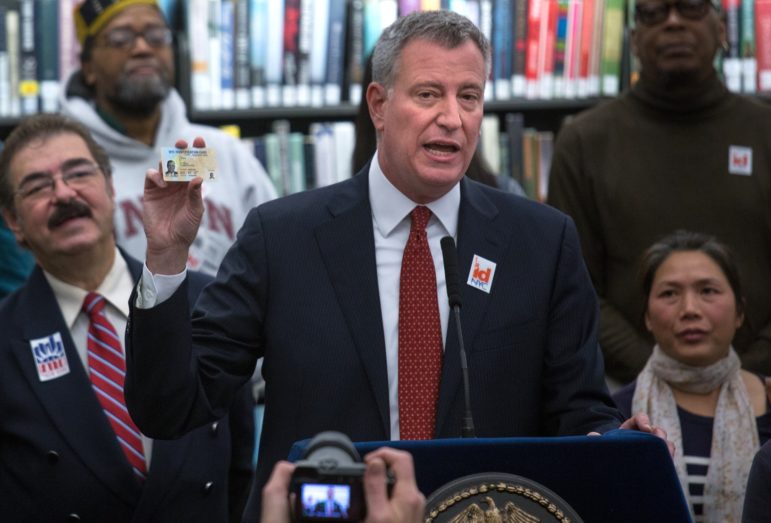
William Alatriste/New York City Council
The city is proposing to add smart chips to IDNYC cards.
Read the original story in Spanish at El Diario
Translated and condensed by Carlos Rodríguez Martorell
The addition of a smart chip to the identification cards issued by the city, known as IDNYC, continues to meet strong resistance from organizations and political leaders, even those who promoted and applauded the creation of the municipal document five years ago.
“The city wants to partner with a third-party firm to add a financial technology chip to the cards, saying that this will help New Yorkers incorporate to other programs,” said Councilman Carlos Menchaca, chair of the City Council’s Committee on Immigration. He has joined a coalition that opposes the chip, which they deem “a risk for immigrants.”

Voices of New York spotlights ethnic and community reporting from around the city. Click here to read more.
The Brooklyn councilmember explained that, even though the city deletes personal information, federal law generally requires companies offering financial services to collect and retain this data. Menchaca added that despite the fact that laws exist ordering the deletion of the personal data of IDNYC carriers, these would not apply to the company providing the chip.
Menchaca has introduced a bill that would prohibit the city from adding a smart chip to the ID cards; the City Council is scheduled to hold a committee meeting about the legislation on Wednesday.
The coalition opposing the change – which includes the New York Civil Liberties Union (NYCLU,) the Legal Aid Society, the New York Immigration Coalition (NYIC,) the New Economy Project, and Make the Road New York (MRNY) – said they are mobilizing at every level to prevent the “upgrade,” set for January 2020, from happening. Daniel Schwarz, privacy and technology strategist for the NYCLU, explained that the De Blasio Administration’s plan would represent “a grave risk.”
Activists say that allowing the integration of the ID with a wide range of private systems, including financial services, homeless shelters, the subway and other benefits, puts vulnerable card carriers at risk.
“So far, the IDNYC has been efficient due to its simplicity,” said Natalia Aristizábal, a member of MRNY. “The program made a commitment to not store the data of applicants to protect their information from possible excesses on the part of the federal government. However, the proposed changes introduce unnecessary complications, as well as potential hazards for the program.”
‘With or without a chip’
Mexican immigrant Teófilo*, who has the ID, said that “with or without a chip” the reach and benefits provided by the card are “quite limited.”
“Banks do not really accept it as valid identification to open an account. Outside of New York City limits, the card has no value,” he said.
Teófilo, a Bronx resident, said that the identification card was useful when he enrolled his children in school and to access libraries, but added that he would think twice about renewing it if that implied a risk to the safety of sensitive data, as some experts have stated.
Venezuela native José * also said that, even though the IDNYC he obtained two years ago has served him to navigate some city services, he would rather wait for the driver’s license approved for undocumented people, which takes effect in December and which people will be able to apply for in the same month.
“The utility of this ID would be too low considering the risk it signifies to have it include a technology similar to that of credit cards. In any case, I think that your data is never safe once you enter the financial system and pay your taxes. I do not believe anyone can have absolute privacy in this country, with or without a chip,” he said.
For his part, Ecuadoran Serafino* agrees that, when you are undocumented, “you are at risk when you wake up every morning.”
“I never wanted to get that ID; I did not see any advantage in having it. We undocumented people need to understand that if it’s your turn, it’s your turn. The important thing is to go out every day to make an honest living and to stay away from trouble with the police. Aside from that, being undocumented is like Russian roulette, regardless of the ID you have,” he added.
*Editor’s Note: City Limits is withholding last names for privacy reasons.









One thought on “Amidst IDNYC ‘Smart Chip’ Debate, Immigrants Complain Of Cards’ Limited Benefits”
Pingback: Amidst IDNYC ‘Smart Chip’ Debate, Immigrants Complain Of Cards’ Limited Benefits – City Limits – The Importance of Business